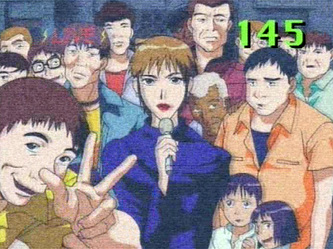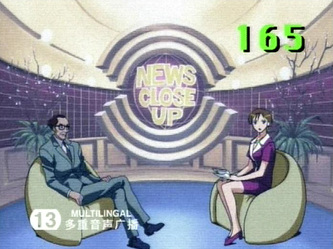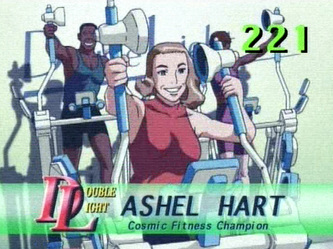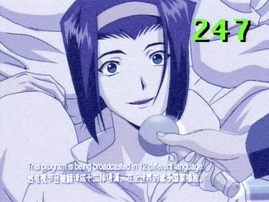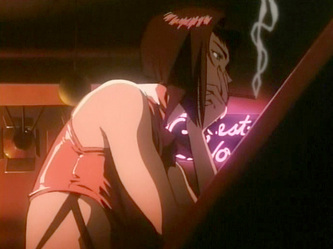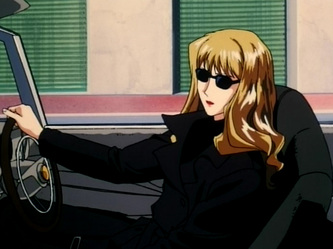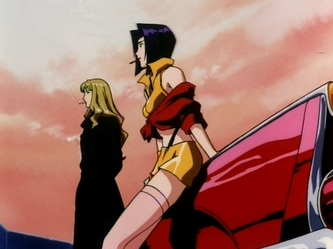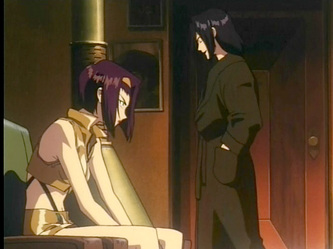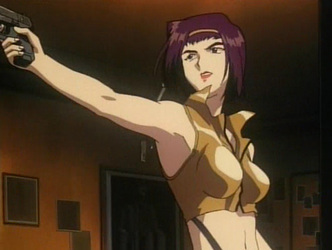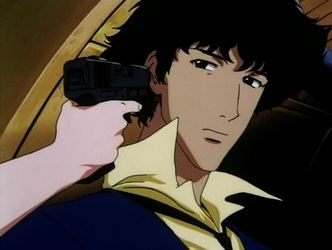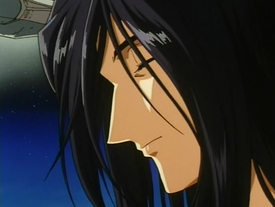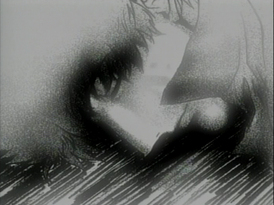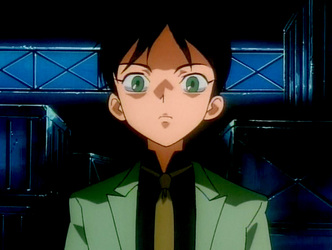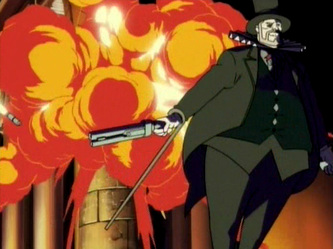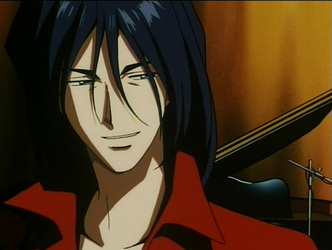Of Ironies and Parallels
WARNING: This article contains session SPOILERS
One of the greatest pleasures for a Cowboy Bebop fan is, I dare say, the continual process of peeling back the layers of the series to discover hidden reference and puns which were woven into the very fabric of the story. As it is set in the future, it is in a prime position to further enhance the story-telling experience with references to the past, the present and even to the envisioned future.
When you see Spike channel-surfing in the beginning of Brain Scratch does it not strike you funny how, despite gargantuan leaps in space technology, the visual medium of tomorrow's world is not spared of the multitude of trashy talk shows (broadcasted in 13 languages!) that plague us today? Are you not inclined to smirk at the familiar promise on the DIAL-A-SHOW, "In order to protect privacy, we change some voices" and the sobbing hysteria that seem to go hand-in-hand with such programmes? And let's not forget the telephone shopping where you can buy the latest work out machine. Man may have colonized the solar system, but there's just no keeping the fat off. Some things never change.
When you see Spike channel-surfing in the beginning of Brain Scratch does it not strike you funny how, despite gargantuan leaps in space technology, the visual medium of tomorrow's world is not spared of the multitude of trashy talk shows (broadcasted in 13 languages!) that plague us today? Are you not inclined to smirk at the familiar promise on the DIAL-A-SHOW, "In order to protect privacy, we change some voices" and the sobbing hysteria that seem to go hand-in-hand with such programmes? And let's not forget the telephone shopping where you can buy the latest work out machine. Man may have colonized the solar system, but there's just no keeping the fat off. Some things never change.
My point is that the CB creators embedded a good deal of ironies and parallels into the series, and it is up to us to discover those gems. Some of them are more blatant than others, like the jab at the stereotypical otaku in Speak Like a Child and the reference to the story of the Tortoise and the Hare when the the video tape is delivered first by a company with a Tortoise logo and the tape recorder is delivered later by a "Hare company". And how can we fail to mention the hilarious Mushroom Samba, which takes its form after Blaxploitation movies, and the hosts of Big Shot Punch and Judy, who are most likely named after the puppets in the eponymous medieval puppet show? (The only thing I don't get about that last one is why, out of all the famous partners in history, they chose to pick one of a violent husband who constantly beat up his wife. Random.) So, what other references could one pick up from watching CB?
To start simply, look at the names of the characters. Vicious is self-explanatory; it suits a man who feeds on bitterness, revenge and malice. Some have speculated that there's a meaning to Spike's last name Spiegel, which is German for "mirror", but I personally don't think there's much to it. Yes, there are several instances in the series where dialogues, characters and even sessions mirror one another, but I don't think they all come back round to the green -haired hero. It's a cool name and that may have been sufficient reason for the creators to adopt it, but I'll be happy to hear from anyone who can give some coherent explanation for it.
Faye, now, is another matter. As one of the most outwardly cynical characters in the series, it is truly ironic that she should be given a name that means "faith and trust". Also interesting are the parallels drawn between her and Julia as pointed out by Michele in this essay.
Faye, now, is another matter. As one of the most outwardly cynical characters in the series, it is truly ironic that she should be given a name that means "faith and trust". Also interesting are the parallels drawn between her and Julia as pointed out by Michele in this essay.
Recall the car chase scene in the Real Folk Blues I. Julia asks Faye for her name, which Faye gives as "Faye Valentine" then adds drily, "A common name." Clearly that is not the case at all but it is a typically candid response that we would expect from Faye the Aloof. What makes this exchange brilliant is what follows:
FAYE
What's yours?
JULIA
Julia.
FAYE
Julia...?!
JULIA
It's a common name.
The dialogue mirrors the previous one perfectly, but this time round the comment actually makes sense. "Julia" is indeed a fairly common name, especially when you compare it to something like "Faye Valentine". But juxtapose this simple truth against a wry comment and the whole exchange suddenly exudes well-crafted style.
But perhaps there's more to this exchange than sheer style. Think of the way Faye watches over an injured Spike while humming a tune and its uncanny resemblance to the way Julia tended to Spike in a flashback (Ballad of Fallen Angels); think about the fact that both women chose to sit on the same stool as Gren played on in Rester House (Jupiter Jazz II) and other instances where Faye is shown in a similar light to Julia throughout the series. "It's a common name." Could this also be a double entendre underscoring the figurative similarities between the two women? Granted, the script was first written in Japanese, and the words "common" and " ordinary" probably can't be used interchangeably like in English. Still, we're talking about a production team who joked about Charlie "father of the bebop style" Parker and Goethe here, so I wouldn't put it past them to insert a double meaning into an already snazzy exchange.
While on the topic of character parallels, aren't the similarities drawn between Spike and Gren rather neat? Recall their last dialogue with Faye respectively:
FAYE
Why are you going to see Vicious? Didn't you just say that he framed you?
GREN
I want to see if he really did.
FAYE
You're going to die.
GREN
I'm not afraid to die.
versus Spike's farewell dialogue:
FAYE
...Where are you going?! Why do you have to go?! Are you telling me you're going to just throw your life away?!
SPIKE
I'm not going there to die. I'm going there to see if I really am alive.
Both men seem to be resolutely looking for some proof or confirmation that their life panned out the way they thought it did. They were, to quote Jet in the story of Kilimanjaro, "searching frantically for proof that they were alive... right before their death". And how about the gunshot farewell Faye gives them, the somewhat contented look of their profile after they deal with their past and the way the camera pans up into deep space as the light of a star blinks out? Further, there are only two sessions out of the twenty-six that do not end with that lovely song, The Real Folk Blues. Guess which two?
FAYE
What's yours?
JULIA
Julia.
FAYE
Julia...?!
JULIA
It's a common name.
The dialogue mirrors the previous one perfectly, but this time round the comment actually makes sense. "Julia" is indeed a fairly common name, especially when you compare it to something like "Faye Valentine". But juxtapose this simple truth against a wry comment and the whole exchange suddenly exudes well-crafted style.
But perhaps there's more to this exchange than sheer style. Think of the way Faye watches over an injured Spike while humming a tune and its uncanny resemblance to the way Julia tended to Spike in a flashback (Ballad of Fallen Angels); think about the fact that both women chose to sit on the same stool as Gren played on in Rester House (Jupiter Jazz II) and other instances where Faye is shown in a similar light to Julia throughout the series. "It's a common name." Could this also be a double entendre underscoring the figurative similarities between the two women? Granted, the script was first written in Japanese, and the words "common" and " ordinary" probably can't be used interchangeably like in English. Still, we're talking about a production team who joked about Charlie "father of the bebop style" Parker and Goethe here, so I wouldn't put it past them to insert a double meaning into an already snazzy exchange.
While on the topic of character parallels, aren't the similarities drawn between Spike and Gren rather neat? Recall their last dialogue with Faye respectively:
FAYE
Why are you going to see Vicious? Didn't you just say that he framed you?
GREN
I want to see if he really did.
FAYE
You're going to die.
GREN
I'm not afraid to die.
versus Spike's farewell dialogue:
FAYE
...Where are you going?! Why do you have to go?! Are you telling me you're going to just throw your life away?!
SPIKE
I'm not going there to die. I'm going there to see if I really am alive.
Both men seem to be resolutely looking for some proof or confirmation that their life panned out the way they thought it did. They were, to quote Jet in the story of Kilimanjaro, "searching frantically for proof that they were alive... right before their death". And how about the gunshot farewell Faye gives them, the somewhat contented look of their profile after they deal with their past and the way the camera pans up into deep space as the light of a star blinks out? Further, there are only two sessions out of the twenty-six that do not end with that lovely song, The Real Folk Blues. Guess which two?
The most immediate advantage of drawing parallels between the two is that the already-classy series scores more brownie points in the "style" department. But at the same time we can also view both character's life and actions in the context of the other's, and inherently gain more insight into both. The story is that much richer with it all, no?
On a side note, did you know that "Tales of Kilimanjaro" happens to be a song by Santana, the band famous for their unique blend of rock, jazz and blues music? Another fun fact related to names: we first hear more about Julia when the action turns to Callisto, one of Jupiter's moons. Julia, as sheer coincidence will have it, is the Latinate feminine form of Julius, which itself stems from the name of the Roman god Jupiter. Callisto, in case anyone's wondering, means "most beautiful", derived from Greek kallistos. Like Spike Spiegel, I honestly don't think there is anything deeply significant attached to these names, but it's interesting all the same.
And what of Laughing Bull's nicknames for Spike and Jet? In the very first session, he calls Spike "Swimming Bird"; in the very last, our resident fortune teller labels Jet "Running Rock". Jet isn't crazy about his newfound nickname, but as always Laughing Bull doesn't seem to be wide of the mark. Throughout the series, we see Jet playing the role of the caretaker. He cooks, sews and rescues his wayward crew. He is a comparatively more stable and reliable character, and this extends to his bulky, bodyguard-esque physique too.
JET (to Alisa)
Back then, when I got home from work, you always waited for me... That was all I needed.
At heart he's really just a very down-to-Earth kind of guy who would've most likely settled down to a nice, ordinary life if Alisa hadn't walked out on him. All told, he's a bit like a sturdy piece of rock. It seems that the Alisa incident cut him far more than he is willing to admit. He puts up a tough front in part because he's a old-school kind of man who doesn't like to show much emotional weakness.
The trouble is, it seems Jet's developed a kind of commitment phobia after Alisa's sudden departure, manifested in the way he now makes a living as a bounty hunter, a freelancer of sorts. He's always on the go, jetting off (no pun intended, thank you) to whichever corner of the solar system the latest target bounty takes him. Essentially, he's denying himself of the chance to live the dream life he once wanted, avoiding it like the plague and choosing other wanderers as companions instead. Running Rock, indeed.
"Swimming Bird" is also a nice lil' caricature of Spike. Just like , Spike's true nature is revealed in the second word, but the first points to his current state. It's been three years since he left the syndicate, and all this while he's been living in an environment that doesn't fit his true persona. This guy here is also avoiding the past like the plague, but sticking himself into an entirely different environment hardly helps. So that's another creature stuck in limbo, just managing to stitch together some form of existence that could be called a "life" before he can no longer live in that false milieu.
And what of Laughing Bull's nicknames for Spike and Jet? In the very first session, he calls Spike "Swimming Bird"; in the very last, our resident fortune teller labels Jet "Running Rock". Jet isn't crazy about his newfound nickname, but as always Laughing Bull doesn't seem to be wide of the mark. Throughout the series, we see Jet playing the role of the caretaker. He cooks, sews and rescues his wayward crew. He is a comparatively more stable and reliable character, and this extends to his bulky, bodyguard-esque physique too.
JET (to Alisa)
Back then, when I got home from work, you always waited for me... That was all I needed.
At heart he's really just a very down-to-Earth kind of guy who would've most likely settled down to a nice, ordinary life if Alisa hadn't walked out on him. All told, he's a bit like a sturdy piece of rock. It seems that the Alisa incident cut him far more than he is willing to admit. He puts up a tough front in part because he's a old-school kind of man who doesn't like to show much emotional weakness.
The trouble is, it seems Jet's developed a kind of commitment phobia after Alisa's sudden departure, manifested in the way he now makes a living as a bounty hunter, a freelancer of sorts. He's always on the go, jetting off (no pun intended, thank you) to whichever corner of the solar system the latest target bounty takes him. Essentially, he's denying himself of the chance to live the dream life he once wanted, avoiding it like the plague and choosing other wanderers as companions instead. Running Rock, indeed.
"Swimming Bird" is also a nice lil' caricature of Spike. Just like , Spike's true nature is revealed in the second word, but the first points to his current state. It's been three years since he left the syndicate, and all this while he's been living in an environment that doesn't fit his true persona. This guy here is also avoiding the past like the plague, but sticking himself into an entirely different environment hardly helps. So that's another creature stuck in limbo, just managing to stitch together some form of existence that could be called a "life" before he can no longer live in that false milieu.
There are many more parallels and ironies scattered throughout Cowboy Bebop. Like how the antagonists of Pierrot Le Fou and Sympathy for the Devil are reversals of each other. In the former, we have a grown man whose mind has regressed to that of a child's; in the latter, we've got an old man trapped in the body of a child. Coincidentally (?), when you add the number of these two sessions together (20 and 6) you just happen to get the total number of sessions in CB. Also, the French film-maker Jean-Luc Godard produced a movie by the name of "Pierrot Le Fou" in 1965 and another called "Sympathy for the Devil" in 1968. Perhaps Sympathy for the Devil isn't just a nod to Rolling Stones after all. (Thanks to Wen for pointing this out.)
And how about the parallel cases of mistaken identities prevalent throughout Jupiter Jazz? Spike is mistaken for Vicious, Jet is mistaken for a bounty, Faye is thought to be a powerless female, and even Julius is confused for Julia... nobody in this show is what they seem at first glance, not least of all Gren! And how fitting is it that the final showdown should take place on Mars, named after the Roman god of war, and better still-- on Tharsis, where some of the solar system's largest and most turbulent volcanoes are found. And then there is a small comeuppance of sorts in the final fight where Vicious slashes across Spike's left leg at the exact spot where Jet was first injured by Van's men in the Real Folk Blues I.
The list goes on and it takes more than a single sitting to discuss the different facets of the ironies and parallels. Suffice to say that on the visual and stylistic fronts, the series is already an elegant masterpiece worthy of many re-viewings. And when you look in the right places and discover those hidden references, it might just make you sit back and chuckle to yourself, "Sweet."
[by Leigh].
And how about the parallel cases of mistaken identities prevalent throughout Jupiter Jazz? Spike is mistaken for Vicious, Jet is mistaken for a bounty, Faye is thought to be a powerless female, and even Julius is confused for Julia... nobody in this show is what they seem at first glance, not least of all Gren! And how fitting is it that the final showdown should take place on Mars, named after the Roman god of war, and better still-- on Tharsis, where some of the solar system's largest and most turbulent volcanoes are found. And then there is a small comeuppance of sorts in the final fight where Vicious slashes across Spike's left leg at the exact spot where Jet was first injured by Van's men in the Real Folk Blues I.
The list goes on and it takes more than a single sitting to discuss the different facets of the ironies and parallels. Suffice to say that on the visual and stylistic fronts, the series is already an elegant masterpiece worthy of many re-viewings. And when you look in the right places and discover those hidden references, it might just make you sit back and chuckle to yourself, "Sweet."
[by Leigh].
HTML Comment Box is loading comments...
